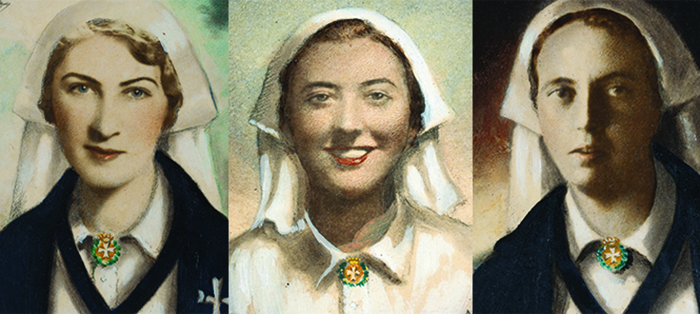José Maria C.S. André
A few days ago (May 29), the Church beatified three Spanish martyr nurses, Olga Pérez (23 years old), María Pilar Gullón (25 years old) and Octavia Iglesias (41 years old).
The three, single, worked in a small hospital in Somiedo, Asturias, and actively participated in church life: they were catechists and they visited the poor, among other things.
On October 27, 1936, when the red militias invaded Somiedo, the three nurses did not want to leave their patients in the hospital. The militiamen burst into the building, shot the sick and tooked the doctor, the staff and the three nurses handcuffed to the commander, known as “El Patas.”
The people who saw the march say that the eight kilometers were very hard for the prisoners. The hospital chaplain and the doctor were immediately murdered and their corpses exposed to the public, but “El Patas” proposed to release the three nurses if they stopped being Catholic and joined the party. The girls refused the proposal and “El Patas” ordered the militiamen to abuse them at will.
The soldiers raped them and tortured them all night long. There was so much shouting that “El Patas” made ox carts ramble in the streets around the house to make noise. Despite the violence, the girls remained loyal to God. They prayed and screamed, and the soldiers also shouted unhinged, while the oxen bellowed outside and the carts screeched through the deserted streets. One of the creaking carts carried the corpse of the hospital chaplain, which had been on display in the village, along with the corpse of the doctor. When night came, the dead chaplain had been left on top of the cart, perhaps forgotten.
The next day, at noon, everybody was exhausted. They took the three nurses unclothed to a field to be shot, tied to two men. The militiawomen who carried the task shot the men first and then the three nurses, who died praising God and forgiving the murderers.
After the shooting, the militiamen desecrated the corpses, dragged them along the ground and left them to rot outdoors until nightfall. When darkness came, they forced some villagers to dig a hole and put them there, dressed in their nurses’ uniform.
These circumstances are known because, after the civil war, “El Patas” told what happened and some inhabitants of the village also gave testimony. Among the many people killed by the militias in those days, the population kept a special memory of these three misses so that, after the civil war, they induced the bishop to take their bodies to the cathedral, in Astorga.
Today, in more peaceful times, it is difficult to conceive of such wild hatred, but according to the Marxist principles human life is worthless and the atmosphere at that time, exacerbated by the cruelty of civil war, made madness a habitual pattern. With no intention of rekindling old hatreds or asking for revenge, Pope Francis considered it would be good for us all to remember these three nurses, who loved God with such generosity and gave their lives for Him. That is why he ordered them to be beatified a few days ago, on May 29, 2021.
Although 85 years have elapsed since the martyrdom and prevailing Marxist-inspired lines of thought are more committed to promoting abortion and euthanasia than to fighting Christians, there are still people unable to look calmly at these examples of virtue. In Spain and Italy, only the Catholic media broadcast the beatification ceremony or reported it. In the rest of the world, the leading news agencies simply skipped the subject. As far as I know, no newspaper in Portugal was aware of the Pope’s decision or broadcast the beatification ceremony.
The Spanish Civil War gave rise to numerous martyrs, several thousands of whom have already been beatified and canonized. They are edifying examples of common people, often children and women, who, when faced with an extreme situation, put God first.
Each of these stories challenges us to ask ourselves how we would react in that moment and how we behave today. Do we hold grudges? Do we pray for others, no matter how fanatic they are? Do we look at them with sympathy? Are we loyal and fair? (Photo: Pilar Gullón, Olga Monteserín and Octavia Iglesias.)


 Follow
Follow


